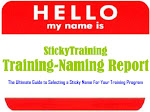In our earlier post we talked about the importance of creating SVP (Sticky Value Proposition), of creating value for others first before expecting to get value.
Before we move on, watch this extremely sticky and powerful commercial of a famous training company.
Hilarious and drives the message - If you’re scared of public speaking, Dale Carnegie has a solution for you - Neat!
Now sample this - a 2 day Dale Carnegie Training workshop on public speaking - Public Speaking Mastery - comes to you with a price tag of $1595 a piece.
On the other hand, another lesser known training workshop on the same topic, of the same duration (or longer) involving the same incidental costs (on training material, venue, food etc..) can be yours for only $200 or even less!!
What’s happening here?
How do companies like Dale Carnegie or Franklin Covey manage to command such a price for their training.
With so many cheaper substitutes available, why would anyone still opt for them?
Here’s the ugly truth - Because the $200 trainers may have done nothing to DIFFERENTIATE themselves in the prospects’ minds.
There's nothing that sets them apart.
This is where USPs, or Unique Selling Propositions, come in - and if you don't have one, you need to get one ... or more.
A USP is your definable difference that makes you worth more in your customer’s mind, enhancing your perceived value. The better your USP, the higher premium you can charge. Hence, you must invest considerable time and effort into creating your USPs. Nothing will give you better results.
Unlike physical goods whose price depends on various factors like price of raw materials, transportation costs, production costs etc, the price of information or knowledge products largely depends on how much value the CUSTOMER assigns to them.
It’s the sum total of their brand equity.
It is the customer’s perceived value that is directly correlated to what price they are willing to pay.
Here’s an unrelated example: If you are out to buy furniture and you were at the marketplace that has 12 furniture stores, which one would you choose?
If they all just had the owners' names or the shop number or a generic name, you would probably pick the one that was less crowded or the closest.
But, if one furniture store puts up a sign that said, ‘Furniture Design Award Winner 5 Years in a Row', you're probably not going to miss that one.
If another store had a sign that read, ‘The only store selling antique and reclaimed furniture'; you're going to go there, too. Suddenly, the other ten stores become invisible.
And that’s what you become when you don't have a differentiator - invisible.
Invisible from Google’s search results, invisible from the prospect’s mind and invisible from the market.
As Jack Trout once said - You differentiate or you die.
So, how do you differentiate yourself and your training product so that you're able to charge premium prices, and then how do you sell it?
What sets YOU apart?
What makes you SPECIAL?
We’ll leave you with that thought.
Watch our future posts for more on this topic and for more strategies on differentiation.
Stay sticky.






